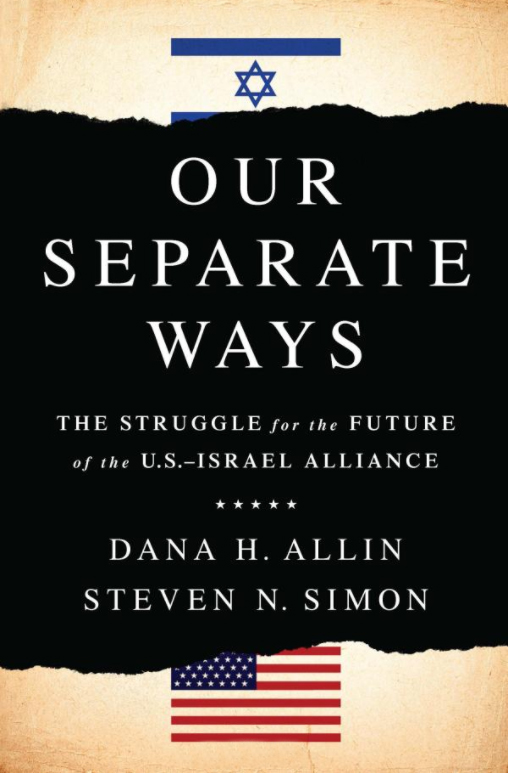Our Separate Ways: The Struggle for the Future of the U.S.–Israel Alliance, Dana H. Allin & Steven N. Simon (PublicAffairs, June 2016)
America’s alliance with Israel will not be the most urgent issue facing Donald Trump in his first weeks in the White House. But it faces an uncertain future – and not only on the (reasonable) assumption that a two-state solution to the conflict with the Palestinians is unlikely to be agreed any time soon. The Trump transition team could do worse than read a book that stands on the familiar territory of Middle East strategy and diplomacy, but which focuses, unusually, on long-term social and political changes in both countries. The signs are, it argues, that Israel will continue to move to the right and the US to lose patience with the most genuinely ‘special’ foreign relationship it has.
Our Separate Ways begins with a scene-setting overview of familiar landmarks from Roosevelt via Nixon, Jimmy Carter and the two Bushes. Evidence of American irritation with Israel appeared occasionally under Bill Clinton but the deterioration has been most striking under Barack Obama, whose two terms were marked by increasingly fractious dealings with Binyamin Netanyahu. From 2009 to 2016, stony faces and public spats were accompanied by private acrimony that included words like ‘chickenshit’ as well as Israeli attacks on American Jewish officials that sound distinctly anti-semitic. Netanyahu’s trenchant opposition to the landmark 2015 nuclear deal with Iran and Obama’s failure to secure a settlement freeze created unprecedented strains.
Dana Allin and Steven Simon, a highly experienced pair of policy analysts/practitioners, point to deeper factors at work. In Israel these ‘dissonant trajectories’ include the hegemony of right-wing political parties, increasing religiosity, the high birthrate of the Haredi (ultra-orthodox Jewish) population and their disproportionate presence in illegal settlements in the occupied territories. Economic trends include an underfunded and underperforming education system and a massive brain drain. Anti-Arab prejudice is on the rise – hardly surprising given the erasure of the 1967 ‘green line’ border (despite the security barrier/wall) and violence ranging from Hamas rockets to random stabbings.
Netanyahu hailed the two countries’ ‘shared values, interests and destiny’ when he congratulated Trump on his victory. But ritual language like that rings increasingly hollow, as the authors note:
‘It was once possible to project Manifest Destiny and the settlement of the frontier onto border kibbutzim, overlooking orange groves on one side and hostile states on the other, (but) it is much harder to see Haredi settlements on the occupied West Bank in this light.’
On the American side is impatience with a demanding ally that continues to get its way even as its policies look ‘less attractive and understandable’. Young US Jews increasingly prioritise liberal values over Zionist ones – so electoral calculations about the ‘Jewish vote’ matter less. And Israel flaunts its disdain: a preference for allies like Russia, China and India suggests resentment of the ‘encumbrances, especially regarding the Palestinians, that Washington attaches to its support’. Traditional assertions of ‘unbreakable devotion’ to Israel may therefore be a thing of the past. Is this overstated? After all, the authors rightly note the prevalence of neoconservative devotion to ‘military force and moral certainty’ as well as the influence of pro-Zionist Christian Evangelicals. And, writing before the election, they did warn of a worst case in which ‘the US and Israel could be joined darkly in a kind of shared Trumpismo’.
The best practical way ahead, they suggest, may be to revive an old idea of a binding (Nato-style) US defence treaty in return for Israeli commitment to a viable settlement with the Palestinians. The problem with this is that it looks unlikely in the light of the evidence they have marshalled of ‘a dysfunctional couple in a loveless marriage, moving inexorably in separate ways’. Nor does Trump’s hostile attitude to the Atlantic Alliance augur well for such a move.
Hillary Clinton was indulgent towards Israel and sympathetic to its narrative. Earlier this year, she fretted about ‘young Americans who did not see Israel in a fight for survival again and again, and young Israelis who didn’t see the United States broker peace at Camp David or kindle hope at Oslo or stand behind Israel when it was attacked’. Palestinian perceptions of American one-sidedness should be more worrying. Obama, for all his irritation with Netanyahu and what he represents, appears to share those blind spots: How else to explain the approval of a $38 billion military aid package for Israel, the biggest ever for any country, over the next decade? This is a thought-provoking book about a significant relationship between uniquely close allies. The larger conclusion must be that if the US does not work to bring about a just peace between Israel and the Palestinians, it is hard to see how one will ever be achieved. It is even harder to imagine that Trump will be the president to help make it happen.

No comments:
Post a Comment